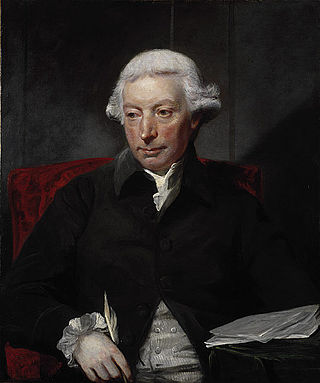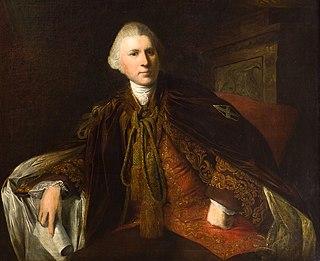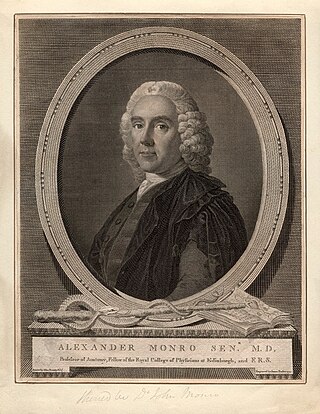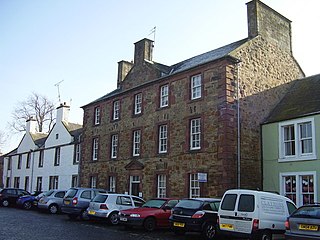Related Research Articles

Henry Home, Lord Kames was a Scottish writer, philosopher and judge who played a major role in Scotland's Agricultural Revolution. A central figure of the Scottish Enlightenment, he was a founding member of the Philosophical Society of Edinburgh and active in The Select Society. Home acted as patron to some of the most influential thinkers of the Scottish Enlightenment, including philosopher David Hume, economist Adam Smith, writer James Boswell, philosopher William Cullen and naturalist John Walker.

The Age of Enlightenment was the intellectual and philosophical movement that occurred in Europe in the 17th and the 18th centuries. The Enlightenment featured a range of social ideas centered on the value of knowledge learned by way of rationalism and of empiricism and political ideals such as natural law, liberty, and progress, toleration and fraternity, constitutional government and the formal separation of church and state.

The Scottish Enlightenment was the period in 18th- and early-19th-century Scotland characterised by an outpouring of intellectual and scientific accomplishments. By the eighteenth century, Scotland had a network of parish schools in the Scottish Lowlands and five universities. The Enlightenment culture was based on close readings of new books, and intense discussions which took place daily at such intellectual gathering places in Edinburgh as The Select Society and, later, The Poker Club, as well as within Scotland's ancient universities.

Adam Ferguson,, also known as Ferguson of Raith, was a Scottish philosopher and historian of the Scottish Enlightenment.

The Georgian era was a period in British history from 1714 to c. 1830–1837, named after the Hanoverian kings George I, George II, George III and George IV. The definition of the Georgian era is also often extended to include the relatively short reign of William IV, which ended with his death in 1837. The subperiod that is the Regency era is defined by the regency of George IV as Prince of Wales during the illness of his father George III. The transition to the Victorian era was characterized in religion, social values, and the arts by a shift in tone away from rationalism and toward romanticism and mysticism.

William Robertson FRSE FSA Scot was a Scottish historian, minister in the Church of Scotland, and Principal of the University of Edinburgh. "The thirty years during which [he] presided over the University perhaps represent the highest point in its history." He made significant contributions to the writing of Scottish history and the history of Spain and Spanish America. For his history of Spain, he was elected to Spain's Royal Academy of History.

George Dempster of Dunnichen and Skibo FRSE FSA (Scot) (1732–1818) was a Scottish advocate, landowner, agricultural improver and politician who sat in the House of Commons between 1761 and 1790. Dempster founded the bank George Dempster & Co. in 1763, was a Director of the East India Company from 1769, and served as Provost of St Andrews (1780) and a Director of the Highland Society of Scotland (1789).

Alexander Monro was a Scottish surgeon and anatomist. His father, the surgeon John Monro, had been a prime mover in the foundation of the Edinburgh Medical School and had arranged Alexander's education in the hope that his son might become the first Professor of Anatomy in the new university medical school.
The Poker Club was one of several clubs at the heart of the Scottish Enlightenment where many associated with that movement met and exchanged views in a convivial atmosphere.

The Edinburgh Cape Society is a convivial Edinburgh tavern-based society which was first established in the 18th century. It is one of many Convivial Edinburgh Societies which were extant in the 18th century, but the only (known) one which survives to the present day.

The history of education in Scotland in its modern sense of organised and institutional learning, began in the Middle Ages, when Church choir schools and grammar schools began educating boys. By the end of the 15th century schools were also being organised for girls and universities were founded at St Andrews, Glasgow and Aberdeen. Education was encouraged by the Education Act 1496, which made it compulsory for the sons of barons and freeholders of substance to attend the grammar schools, which in turn helped increase literacy among the upper classes.

The Midlands Enlightenment, also known as the West Midlands Enlightenment or the Birmingham Enlightenment, was a scientific, economic, political, cultural and legal manifestation of the Age of Enlightenment that developed in Birmingham and the wider English Midlands during the second half of the eighteenth century.

Andrew Duncan, the elder FRSE FRCPE FSA (Scot) was a British physician and professor at the University of Edinburgh. He was joint founder of the Royal Society of Edinburgh. As first proposer of an asylum in Edinburgh he gives his name to the Andrew Duncan Clinic which forms part of the Edinburgh City Hospital.
George Young (1692–1757) was an Edinburgh surgeon, physician, philosopher, and empiric. As a young man, he was a member of the Rankenian Club, a group of intellectuals who went on to become some of the most influential figures of the Scottish Enlightenment. Young's lecture notes (1730–31) give a clear account of contemporary medical and surgical practice and are characterised by the empirical approach to the advancement of medical knowledge, especially in the evolving understanding of nerve and muscle function. His Treatise on Opium (1753) was a practical guide for physicians in the use of the drug which emphasises its complications. It was the longest, most balanced and most comprehensive English language account yet written. Young's legacy is also apparent in the work of his pupil Robert Whytt (1714–1766) and his surgical apprentice James Hill (1703–1776). Young had taught both the value of repeated observation and a sceptical approach to prevailing dogma. Whytt was to advance knowledge of nerve and muscle function, while Hill went on to make important contributions to the understanding and management of head injury.

Scottish art in the eighteenth century is the body of visual art made in Scotland, by Scots, or about Scottish subjects, in the eighteenth century. This period saw development of professionalisation, with art academies were established in Edinburgh and Glasgow. Art was increasingly influenced by Neoclassicism, the Enlightenment and towards the end of the century by Romanticism, with Italy becoming a major centre of Scottish art.

Scots-language literature is literature, including poetry, prose and drama, written in the Scots language in its many forms and derivatives. Middle Scots became the dominant language of Scotland in the late Middle Ages. The first surviving major text in Scots literature is John Barbour's Brus (1375). Some ballads may date back to the thirteenth century, but were not recorded until the eighteenth century. In the early fifteenth century Scots historical works included Andrew of Wyntoun's verse Orygynale Cronykil of Scotland and Blind Harry's The Wallace. Much Middle Scots literature was produced by makars, poets with links to the royal court, which included James I, who wrote the extended poem The Kingis Quair. Writers such as William Dunbar, Robert Henryson, Walter Kennedy and Gavin Douglas have been seen as creating a golden age in Scottish poetry. In the late fifteenth century, Scots prose also began to develop as a genre. The first complete surviving work is John Ireland's The Meroure of Wyssdome (1490). There were also prose translations of French books of chivalry that survive from the 1450s. The landmark work in the reign of James IV was Gavin Douglas's version of Virgil's Aeneid.

Scottish education in the eighteenth century concerns all forms of education, including schools, universities and informal instruction, in Scotland in the eighteenth century.
Events from the year 1754 in Scotland.

Adam Drummond of Binend (1679-1758) was a Scottish surgeon-apothecary who was appointed, jointly, as the first Professor of Anatomy at the University of Edinburgh.
James A. Harris, FRSE is a British philosopher and professor of the history of philosophy at the University of St Andrews. He is known for his works on the history of British philosophy and, in particular, on the philosophy of David Hume.
References
- ↑ Emerson, Roger L. The Social Composition of Enlightened Scotland: The Select Society of Edinburgh, 1754–1764. (Studies on Voltaire and the Eighteenth Century) (1973)
- ↑ "Enlightenment Scotland: Edinburgh's Select Society". 10 February 2018.
- ↑ "Significant Scots: George Drummond". Electric Scotland.
- ↑ David Denby (11 October 2004). "Northern Lights: How modern life emerged from eighteenth-century Edinburgh". The New Yorker .
[p. 3] A convivial bachelor, he [Hume] required company, preferably a dinner party at home (he prided himself on his "cookery") or a debate at the Select Society, a group of fifty of Edinburgh's most clubbable and erudite minds.
Review of James Buchan's Crowded With Genius (Capital of the Mind in the UK) - ↑ "The Monros of Auchinbowie and Cognate Families". By John Alexander Inglis. Edinburgh. Printed privately by T and A Constable. Printers to His Majesty. 1911.
- ↑ "The Select - A Brief History". Archived from the original on 29 September 2007.
- ↑ The Poker Club (1762–1784)
- ↑ "An Account of the Select Society of Edinburgh". The Scots Magazine. 17: 126–127. 1755 – via HathiTrust.